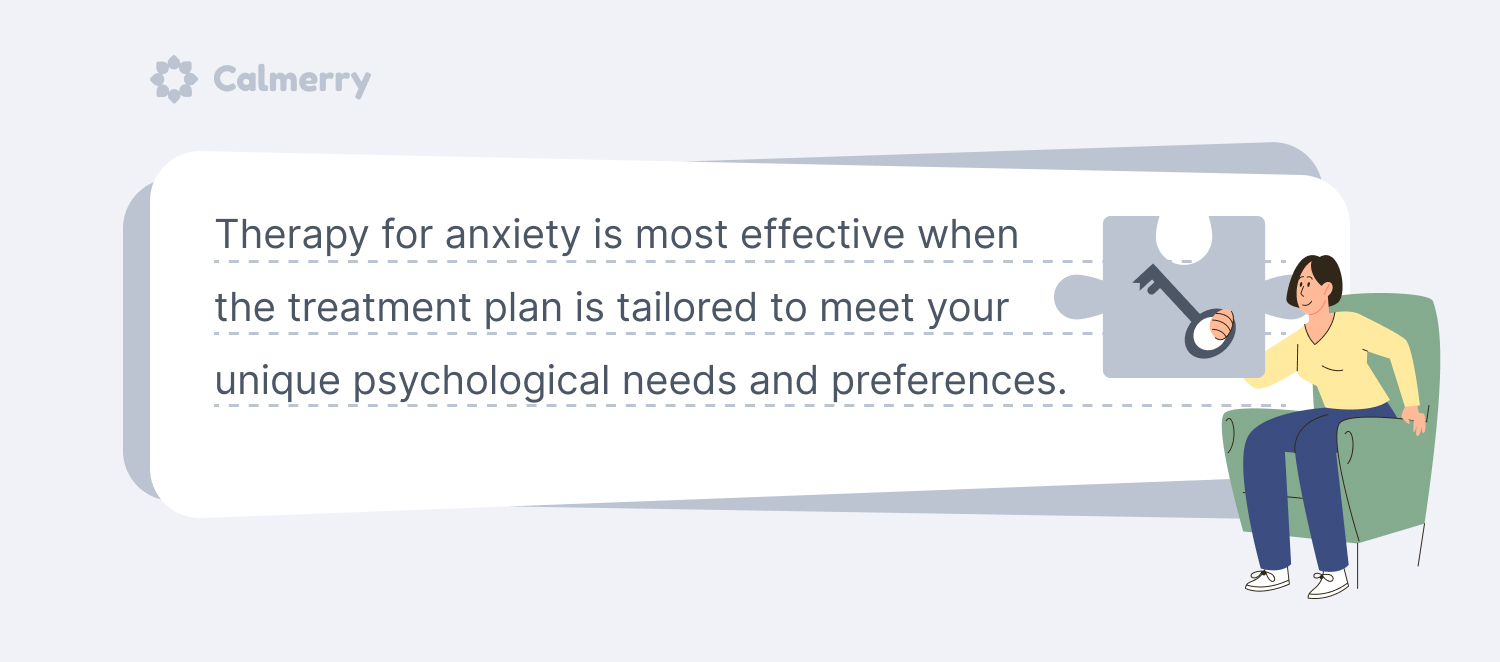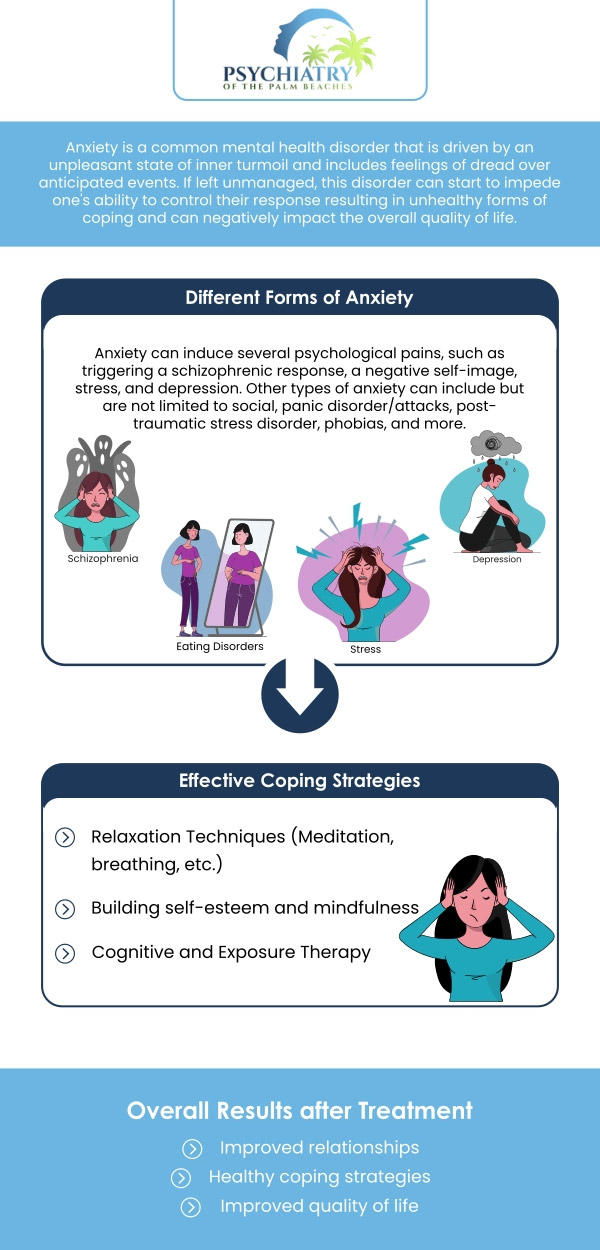Reclaim your peace of mind through proven therapy for anxiety
Reclaim your peace of mind through proven therapy for anxiety
Blog Article
Exploring Different Strategies in Counselling for Stress And Anxiety Problem for Lasting Modification
When taking on anxiousness disorders, it's crucial to explore a range of therapy strategies. Each method provides special understandings and devices to help you manage your signs properly. You could find that incorporating techniques can generate the most effective results. Recognizing the subtleties of these approaches is essential to fostering long lasting modification. What if the appropriate combination could release a new level of psychological health for you?
Understanding Anxiety Conditions: A Short Introduction
Stress and anxiety problems, which affect millions of people worldwide, can substantially influence day-to-day live. You could experience frustrating feelings of concern or worry that seem irrepressible. These sensations can lead to physical signs like a racing heart, sweating, or even dizziness. Typical types of stress and anxiety conditions consist of generalized anxiousness problem, panic condition, and social stress and anxiety disorder. Each has one-of-a-kind indications, however they all share a tendency to interrupt your routine and relationships.Understanding the origin of your anxiousness is essential. It may stem from genetics, brain chemistry, or life experiences. Recognizing your triggers can help you handle your feedbacks much better. It is essential to keep in mind that you're not the only one in this struggle. Many individuals face similar obstacles, and seeking aid is a strong action toward sensation much better. By finding out about anxiety problems, you're currently on the course to understanding and handling your problem better.
Cognitive-Behavioral Treatment: Challenging Unfavorable Thought Patterns
In Cognitive-Behavioral Treatment, you'll start by recognizing the unfavorable thought triggers that add to your stress and anxiety. Counseling services for anxiety. When you acknowledge these ideas, you'll work with replacing them with even more positive options. With each other, you'll construct reliable coping approaches to aid handle your anxiety in daily situations

Determining Adverse Idea Triggers
Recognizing the particular triggers behind your unfavorable ideas can be necessary in managing anxiousness when you encounter minutes of distress. Beginning by focusing on scenarios that prompt sensations of fear or concern. Is it a crowded room, a forthcoming due date, or a discussion with particular people? Write these instances in a journal. This will certainly aid you recognize patterns in your thinking. Notice physical sensations that accompany your adverse thoughts, like an auto racing heart or rigidity in your upper body. By identifying these triggers, you gain understanding right into what's fueling your stress and anxiety. Understanding these links is the very first action in testing those thoughts and eventually regaining control over your psychological feedbacks.
Changing Ideas With Positives
Challenging unfavorable idea patterns is an essential action in transforming your way of thinking and decreasing stress and anxiety. You might frequently discover on your own trapped in cycles of insecurity or devastating reasoning. Rather than letting these thoughts dictate your sensations, technique changing them with realistic choices or favorable affirmations. When you assume, "I can't manage this," change it to, "I can take care of obstacles one action at a time." This easy adjustment can considerably influence your emotional state. Frequently determining and countering these unfavorable ideas assists produce a healthier internal dialogue. Keep in mind, it requires time and initiative, however continually practicing this strategy can bring about long-term adjustment, empowering you to encounter anxiety with restored confidence and durability.
Structure Coping Approaches Together

Mindfulness and Acceptance-Based Approaches: Growing Present-Moment Awareness
As you browse the complexities of anxiety, including mindfulness and acceptance-based approaches can significantly boost your capability to cultivate present-moment recognition. By concentrating on the present moment, you'll locate that you can observe your thoughts and feelings without judgment. This method aids you recognize your anxiety without really feeling bewildered by it.Engaging in mindfulness exercises, such as deep breathing, body scans, or guided reflections, enables you to ground yourself in your existing experience. Acceptance-based approaches motivate you to embrace your emotions as opposed to fight against them. They shed their power over you.Incorporating these methods right into your daily routine can change just how you react to anxiousness when you accept your sensations. You'll establish resilience and discover to navigate difficult scenarios with higher ease. Eventually, cultivating present-moment understanding lays the structure for long-term change, empowering you to lead a much more meeting life.
Exposure Therapy: Confronting Fears Progressively
Exposure therapy assists you face your concerns in a progressive method, making it less frustrating. You'll learn methods to face anxiety-provoking circumstances detailed, while likewise developing coping approaches to manage your responses (Counseling services for anxiety). This approach empowers you to take control and reduce anxiety with time
Gradual Exposure Methods
When dealing with anxiety, gradually confronting your anxieties can be an effective means to reclaim control. This technique, called progressive exposure, includes slowly revealing on your own to the scenarios or things that trigger your anxiety. Begin with much less challenging scenarios and gradually work your means up to even more challenging ones. As an example, if you hesitate of public talking, you may start by speaking before a mirror, after that progress to sharing thoughts with a good friend, and eventually attend to a little team. Each action helps desensitize you to the worry, building your self-confidence with time. Keep in mind, it's vital to speed on your own and commemorate tiny victories as you move with this procedure, reinforcing redirected here your ability to handle anxiety successfully.
Structure Coping Strategies
Building efficient coping techniques is essential for handling anxiety, particularly as you face your anxieties slowly. One effective method is exposure therapy, where you begin by encountering your concerns in a regulated manner. Start with less intimidating situations and gradually work your means approximately more difficult circumstances. This gradual direct exposure aids desensitize you to anxiousness triggers, making them less overwhelming.Incorporate leisure techniques, such as deep breathing or mindfulness, to relax your mind during direct exposure. Track your progression, commemorating tiny triumphes along the road to increase your confidence. Bear in mind, it's alright to take your time; the objective isn't perfection but consistent enhancement. By constructing these strategies, you'll equip yourself to navigate anxiousness and accept life a lot more fully.
Psychodynamic Treatment: Discovering Origin of Anxiousness
Psychodynamic treatment explores the unconscious mind, exposing the source of your stress and anxiety. By examining your thoughts, sensations, and past experiences, this technique aids you uncover underlying disputes and unresolved problems that might add to your present stress and anxiety. You'll collaborate with a specialist to investigate childhood experiences, partnerships, and emotional patterns that form your feedbacks today.As you gain insight into these much deeper layers of your psyche, you'll begin to identify exactly how previous events influence your present habits. This understanding can bring about catharsis, allowing you to process feelings you might have suppressed.Through the healing connection, you can also determine defense mechanisms that might have developed gradually, using a clearer course to transform. Ultimately, psychodynamic therapy furnishes you with the devices to resolve your anxiety at its core, advertising long lasting improvement in your emotional wellness.
Alternative and integrative Strategies: Incorporating Strategies for Greater Efficacy
Incorporating numerous therapeutic techniques can enhance your trip towards taking care of stress and anxiety a lot more properly (Counseling services for anxiety). By integrating components from cognitive-behavioral therapy, mindfulness visit this site right here practices, and all natural techniques, you can produce a tailored method that addresses your one-of-a-kind needs. For instance, you might make use of cognitive-behavioral methods to test negative thought patterns while incorporating mindfulness workouts to ground yourself in the here and now moment.Additionally, checking out holistic techniques such as yoga exercise or meditation can advertise relaxation and lower anxiety signs. This mix enables you to create higher self-awareness and resilience.Experimenting with these varied methods can aid you uncover what resonates most with you. Bear in mind, it has to do with locating a harmony that functions, instead than staying with a single strategy. This integrative strategy not just provides immediate relief however likewise fosters long-lasting skills for handling anxiety, empowering you to reclaim control over your life

The Duty of Assistance Systems: Building Strength With Link
While it may appear that taking care of anxiousness is a solitary journey, having a solid support group can play a necessary function in your durability. Surrounding on your own with understanding close friends, family, or assistance groups develops a risk-free area where you can honestly share your experiences and sensations. When you get in touch with others, you remind yourself that you're not the only one in this struggle.These relationships supply inspiration and can provide functional coping techniques that have functioned for others. It's also a possibility to acquire perspective; friends can assist you see circumstances in a different way, lowering sensations of isolation.Moreover, psychological assistance cultivates a feeling of belonging, which can considerably relieve anxiousness signs and symptoms. By leaning on your support group, you can construct strength and take on difficulties a lot more properly. Bear in mind, reaching out for assistance suggests strength, and it can make all the difference in your trip towards taking care of stress and anxiety.
Often Asked Concerns

What Are the Typical Signs And Symptoms of Stress And Anxiety Disorders?
You could experience restlessness, fatigue, problem focusing, irritability, muscular tissue tension, and rest disturbances. Physical signs can consist of find this fast heart beat, sweating, and trembling. Identifying these signs early can assist you look for proper support and treatment.
The Length Of Time Does Treatment Normally Last for Anxiousness Disorders?
Therapy for anxiety conditions commonly lasts anywhere from a couple of weeks to several months. It really depends upon your private needs, progress, and the strategies your therapist uses to aid you handle your anxiety efficiently.
Can Medicine Be Utilized Together With Therapy for Stress and anxiety?
Yes, medicine can absolutely be utilized alongside treatment for anxiety. Incorporating both methods often boosts treatment performance, helping you take care of symptoms while checking out underlying problems via therapy. Constantly consult your healthcare service provider for individualized advice.
Exist Self-Help Strategies for Managing Anxiety?
Yes, there are a number of self-help techniques for taking care of anxiety. You can exercise mindfulness, take part in routine workout, preserve a well balanced diet plan, establish a regular, and make use of deep breathing techniques to help in reducing stress and anxiety symptoms effectively.
Just how Do I Know if I Need Specialist Assistance for Anxiety?
You need to think about seeking specialist assistance for anxiousness if it disrupts day-to-day life, triggers significant distress, or if self-help methods aren't working. Trust fund your instincts; connecting can result in far better coping skills and support. Typical types of anxiety problems consist of generalised anxiety disorder, panic problem, and social anxiety disorder. When you encounter moments of distress, recognizing the specific triggers behind your negative thoughts can be necessary in handling anxiousness. Changing adverse ideas is only the beginning of taking care of anxiety successfully. By analyzing your thoughts, feelings, and past experiences, this technique helps you uncover underlying problems and unsettled concerns that might contribute to your present anxiousness. It's also a possibility to get perspective; good friends can help you see situations in a different way, lowering feelings of isolation.Moreover, emotional support promotes a feeling of belonging, which can greatly reduce stress and anxiety signs and symptoms.
Report this page